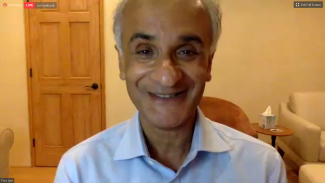
“The only change that doesn’t change, is change itself” someone once said. The world is evolving at such a frantic speed, that many of us often feel lost and disoriented emotionally, day-in, day-out. How do we arrest the fleeting changes? How do we fit in?
Renowned international author, Pico Iyer was speaking to an audience of over 950 students and guests recently at the Lien Fung’s Colloquium, organised by the Office of Core Curriculum and Wee Kim Wee Centre on 8 September.
With increasing globalism and technological advancements, the world has become much smaller today. We access more places than we understand and feel close to cultures far away from where we live. While adapting ourselves to fit the world, there is a need to safeguard what is unique in us, and local. That, according to Mr Iyer, is the constant struggle between globalism and localism.
Pico Iyer was born in England, to parents from India, and educated in California. Given 3 sets of eyes to look at the world, it meant that he had no set answers to all questions, no fixed ways or culture of doing things. He was neither here nor there in terms of race, religion, or caste. He enthused that it was sort of a great liberation that he didn’t fit into a certain category, as it is a chance not to be defined by his passport, but by his passions. Today, he lives in Japan with his wife Hiroko Takeuchi and two children.
He said “Home doesn’t have to be the place you were born, but the place where you feel or become yourself. Our sense of home will keep expanding as we grow, we have different sets of identities, like we have different email addresses for different purposes.”
In the 21st century, where many lines have been blurred due to internationalisation, it is even more challenging to identify our own sense of home, who our community is, and our sense of belonging. However he felt that this is more a great opportunity, as it is always better to have too many choices, than too little.
“The differences and distances between us have actually become greater partly because of the illusion of smallness. Many people are threatened by globalism and want to put us back in the lowest form of localism, known as tribalism”, he said. These people are unsettled by the future so they form tribes, in an effort to fight for supremacy, to bring us back into the simple black and white world. Many of us create such walls to protect ourselves, however it is important that we embrace transformation, as the world is never going back to what is was.
He illustrated this by sharing that in the past when he was much younger, 97% of Americans opposed mixed marriages. Today, only 3% are against mixed unions. In the past, he would never have expected someone like Barack Obama, who is from a multi-racial heritage to someday become the President of America. These, he attributed to globalism at its best.
In a global neighbourhood, each person develops his or her talent so as to serve the needs of the whole. And the community gives back to our needs. Globalism would be impossible without a sense of neighbourhood, as neighbours learn and benefit from each other. It would be dangerous to lock ourselves out.
In closing, he said “Globalism allows us to learn from everywhere, but localism is going to help you to give to everyone. Globalism is your playing field, but localism is your strength.” He encouraged everyone to make constructive use of globalism, and not be afraid of it. “Life is defined by what we do, not by what happens to us. It is up to you, what to make of it. “
The webinar was part of the Lien Fung’s Colloquium series, organised by Singapore Management University (SMU)’s Office of Core Curriculum and Wee Kim Wee Centre.
Click here for the full mediacast.
The Lien Fung’s Colloquium at SMU was established by Mrs Ho Lien Fung in April 2003. The Colloquium aims to enhance public understanding and appreciation of culture and society through lectures, talks and other events, with particular focus on everyday life, while not being dominated by academic or philosophical titles. It was Mrs Ho’s hope that the Colloquium would inspire students as well as satisfy the community’s quest for broader knowledge. The Colloquium is also aligned with SMU’s aim of making meaningful impact by stimulating ideas and interactive discourse on pertinent issues that affect the well-being of people, organisations and societies.